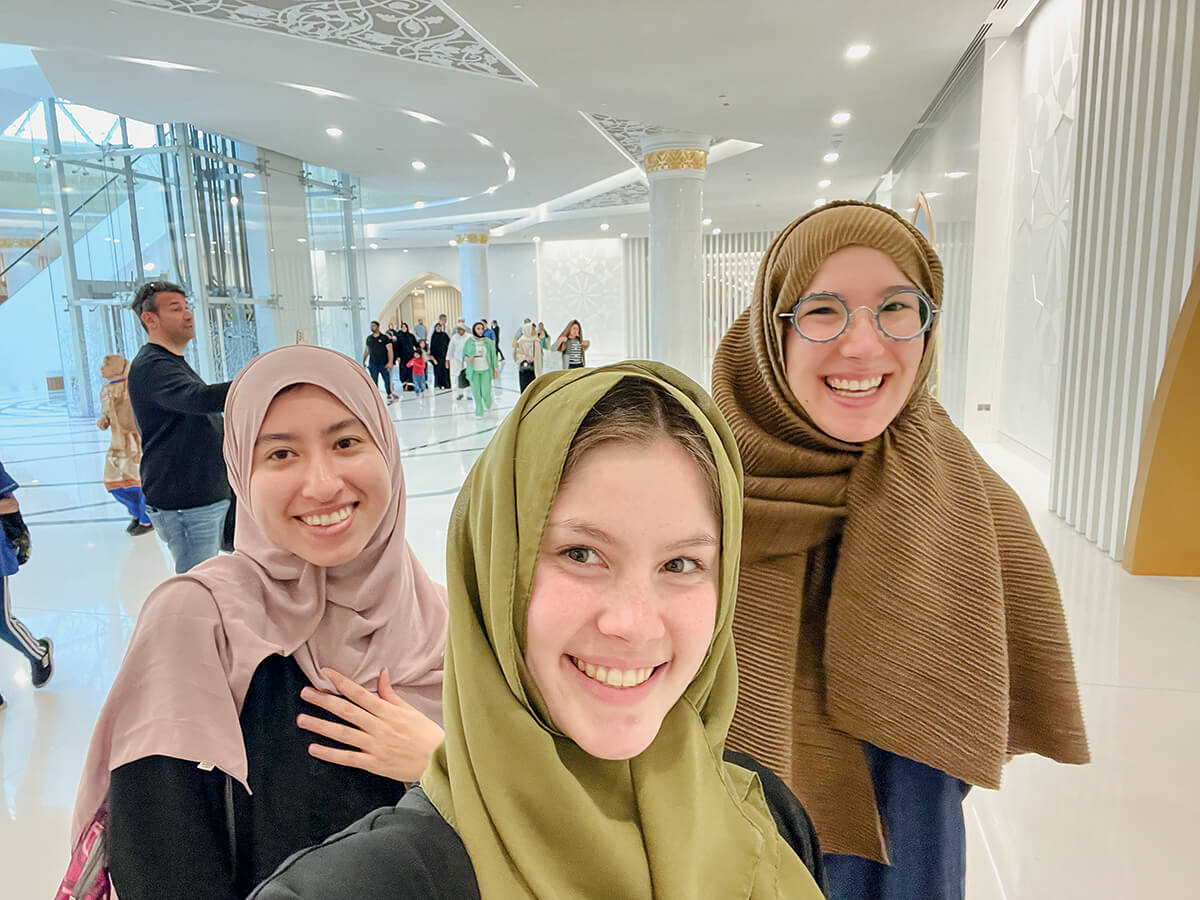lens
Cultivating Social Entrepreneurs
A program for students to address societal problems
 PHOTO: KATIE MERRITTFrom left: Judi Dairawan, a student at American University of Sharjah, with CWRU students Katie Merritt and Margaux Johnstone last spring at the Grand Mosque in Abu Dhabi, United Arab Emirates.
PHOTO: KATIE MERRITTFrom left: Judi Dairawan, a student at American University of Sharjah, with CWRU students Katie Merritt and Margaux Johnstone last spring at the Grand Mosque in Abu Dhabi, United Arab Emirates.Economics undergraduate Katie Merritt knew she wanted to apply her academic interests to help build a more sustainable world—but how?
So when she heard about ThinkImpact Social Entrepreneurship Program—run by Case Western Reserve’s Fowler Center for Business as an Agent of World Benefit and Veale Institute for Entrepreneurship—she applied.
An extracurricular initiative launched in collaboration with Zayed University and the American University of Sharjah in the United Arab Emirates (UAE), ThinkImpact introduces students to entrepreneurship to solve urgent societal problems.
Last year, Merritt and four other students formed a team and began brainstorming. What about designing a quieter wind turbine for residential use? Every week, students alternated between in-person sessions and virtual meetings with students in the UAE—which helped them to start thinking like entrepreneurs. They considered whether their idea was impactful, sustainable and scalable. It wasn’t.
— Megan Buchter, who leads the ThinkImpact Social Entrepreneurship Program and directs the Fowler Center for Business as an Agent of World Benefit
“It doesn’t make economic sense yet for people to buy a wind-energy solution for their house, so introducing another design to the market wouldn’t increase usage,” said Merritt, now a fourth-year student. Her team instead selected an idea that felt more relevant: creating an online, green-energy marketplace that connects consumers and producers and allows for price comparisons.
“You can’t have a solution and go searching for a problem,” she said, explaining a principle she learned through ThinkImpact. “You have to identify the problem first, and then shape a solution around it.”
Founded two years ago, ThinkImpact accepts students from all degree levels. They are in the program for a year and then can rely on other campus entrepreneurship resources.
Last spring, ThinkImpact Director Megan Buchter (CWR ’10, MGT ’15) and 11 students traveled to Dubai to see social entrepreneurship in another country. They also met with students working with Wasseem Abaza (MGT ’14), PhD, an assistant professor of entrepreneurship and strategy at Zayed University. He and Buchter had teamed up to offer parallel programs that run in concert.
It’s possible to participate in ThinkImpact with a clear plan, too. Ibrahim Quagraine, a biomedical engineering PhD student, had founded a company in his native Ghana before joining the program. The company recycles cocoa waste into potash products with a range of uses from agricultural to industrial, seeking to create opportunities for environmental and economic sustainability.
“I will be using the skill set I learned to refine and develop my product ideas,” Quagraine said.





